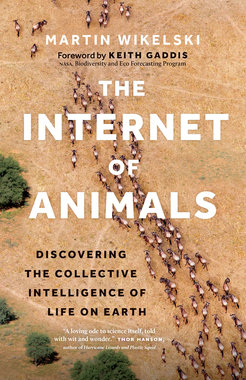The Internet of Animals
The first narrative nonfiction book about the pioneering animal tracking project ICARUS, written by its founder Martin Wikelski, is published by Greystone Books
The Internet of Animals charts the epic story of the International Cooperation for Animal Research Using Space (ICARUS) through the voice of its founder, Martin Wikelski, a director at the Max Planck Institute of Animal Behavior (MPI-AB) and a professor at the University of Konstanz. Publisher Greystone Books released the English edition on May 15.

ICARUS has been heralded as “the internet of animals,” a vast network of data with the potential to radically change our understanding of planet Earth as dramatically as the human genome project deepened our understanding of human DNA. Based out of MPI-AB, and partnering with institutions from around the world, Wikelski and a team of international researchers are attaching mini-transmitters to a variety of animal species: from bees to birds to rodents and bats. As animals move about their habitats and migrate around the globe, transmitters will send data to a receiver in space, which in turn will transmit data to a ground station monitored by ICARUS researchers.
With new tools at their fingertips, scientists in the fields of ecology and behavioral research are on the brink of a quantum leap. As animal senses are finely tuned to their environments, the data gained by the internet of animals may enable scientists to develop systems for predicting natural disasters like earthquakes and volcanic eruptions, track the spread of infectious diseases, identify changes in climate, and better protect endangered species. ICARUS data will be available for the public to view, offering an intimate picture of the natural world, and rare windows into animal behaviors and habitats.
In The Internet of Animals, Wikelski offers the exciting firsthand account of this scientific breakthrough, including surprising facts about the animals we thought we knew. For example, he describes how large land birds fly nonstop for hundreds of miles over the open ocean–without taking a break for food or rest–by exploiting wind and uplift, even adjusting their migratory routes to benefit from the best conditions. Wikelksi also convincingly argues that animals possess a unique “sixth sense” that humans are only beginning to grasp. He describes farm animals becoming restless when earthquakes are imminent. Animals on the African plains sensing when poachers are on the move. Frigatebirds in South America departing before hurricanes arrive.
These are just some of the many revelations of the project, which Wikelski sets in the context of how humans have connected with nature in the past, how this relationship has changed over time, and how modern technology can help humans reconnect to nature and ensure the survival of all life on Earth.
Through honest, down-to-earth stories, Wikelski says he aimed to build a bridge between the animal and human worlds. “This book is my way of reviving our lost connection to the animal world and the knowledge contained within it,” says the German-born scientist.
“We all have experiences with our pets or other animals. By situating scientific knowledge in these everyday experiences, I hope to show how close our two worlds are, and how much we can learn from them—if only we would, or could, listen.”












